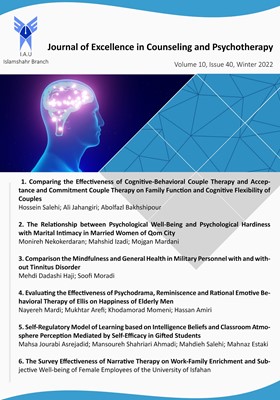Comparing the Effectiveness of Cognitive-Behavioral Couple Therapy and Acceptance and Commitment Couple Therapy on Family Function and Cognitive Flexibility of Couples
Subject Areas : Journal of Excellence in Counseling and Psychotherapy
Hossein Salehi
1
![]() ,
Ali Jahangiri
2
*
,
Ali Jahangiri
2
*
![]() ,
Abolfazl Bakhshipour
3
,
Abolfazl Bakhshipour
3
![]()
1 - PhD Student of Consulation, Department of psychology, Bojnourd Branch, Islamic Azad University, Bojnourd, Iran.
2 - Assistant Professor, Department of Psychology and Consultation, Payame-Noor University, Tehran, Iran.
3 - Assistant Professor, Department of Psychology, Bojnourd Branch, Islamic Azad University, Bojnourd, Iran.
Keywords: family function, cognitive flexibility, cognitive-behavioral couple therapy, Acceptance and Commitment Couple Therapy,
Abstract :
Purpose: The rising trend of divorce statistics and the existence of turmoil in couples relationships has increased the motivation of researchers to find less costly intervention methods to reduce couples problems. The aim of this study was to comparing the effectiveness of cognitive-behavioral couple therapy and acceptance and commitment couple therapy on family function and cognitive flexibility of couples.Methodology: This study was a quasi-experimental with pre-test, post-test and two-months follow-up with a control group. The statistical population included all couples who referred to mehrsai counseling center in Ashkhaneh during 2019, among them, 60 people were selected by the available method and assigned to three equal groups. Therapeutic interventions were applied for each of the two couples therapy approaches in 12 sessions, 1 session per week and 90 minutes per session, But the control group did not receive any medical intervention. Demographic information checklist, family assessment device (Epstein& et al, 1983) and cognitive flexibility inventory (Dennis& VanderWal, 2010) were used to collect data. Data were analyzed by descriptive statistics and analysis of variance with repeated measures using SPSS-26 statistical software.Findings: There was a significant difference in the linear composition of the Family Function and its dimensions include the tendency to (problem solving, communication, roles, involvement and affective responsiveness and behavior control) to difficult situations in terms of group membership, and the interactive effect of the group and time (P=0.001). Besides, the two treatment groups (acceptance and commitment, cognitive-behavioral couple therapy) showed significant differences with the control group in terms of the components of psychological flexibility and its dimensions (P=0.009). Cognitive-behavioral couple therapy has a greater effect on the functioning of couples' families than acceptance and commitment couple therapy (P=0.001), but there was no significant difference between the intervention methods on cognitive flexibility (P=0.092).Conclusion: The results showed the importance of both methods on family functioning and cognitive flexibility of couples. Therefore, counselors and therapists can use these methods, especially cognitive-behavioral couple therapy to intervene in the mental health of couples.
_||_

